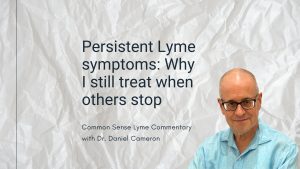Call for your appointment today 914-666-4665 | Mt. Kisco, New York

The authors looked at the perceptions, representations, and experiences of patients who had Lyme disease with nonspecific symptoms and no objective manifestations of the disease. This small study included 12 patients with confirmed and non-confirmed Lyme disease or unexplained symptoms.
“Our study highlights that some physicians may also experience a lack of knowledge and information about [Lyme Borreliosis], increasing the difficulty to answer the patient’s needs,” wrote Raffetin et al. 1
The investigators described several themes from their interviews with patients, along with patient statements expressing their frustrations.
Painful Experience with the Disease, Leading to Confusion and Fear
- “Nothing could bring me relief …, the pain was almost unbearable.”
- “Always tired, tired … tired, tired.”
Incomprehension, Fear, and Doubt when Faced with the Lack of Explanation for the Symptoms
- “We kept doing the analyses, we didn’t understand.”
- “The patients expressed a feeling of fear of unpredictable flare-ups, of not being cured, etc.”
- “I was afraid of not knowing how I would end up.”
Long and Difficult Treatment Path, Experienced as an Obstacle Course
Fight against the Medical World
- “My GP, I am reluctant to ask him, he doesn’t want to believe me.”
- “They don’t listen, … they look at everything medical, and as long as the tests are negative, they say that you have nothing.”
- “The absence of consensus on recommendations at the time of the study has reinforced the feeling of abandonment by the scientific community.”
Disease Taking a Serious Toll on the Patient’s Health
Multiple and Negative Repercussions, Experienced as an Injustice
- “At the professional level, the patients reported absences linked to multiple medical consultations, repeated leave from work, etc.”
- “Activities were impacted by the unpredictability of the symptoms, leading to the feeling of being overwhelmed by the disease.”
- “The patients described either a lack of understanding from their relatives, or unconditional support, sometimes with the family adapting to their condition.”
Frustration expressed by doctors
The authors also described the frustration among doctors treating Lyme disease patients. “According to a survey, one-third of general practitioners experience difficulty when faced with the ‘insistent’ demands of ‘hyper-informed’ patients.”
“The major challenge for the doctor is to determine on one hand the limits of his own knowledge and his capacity to answer the patient, and on the other hand the quality of the patient’s information sources.”
Some of the problems lie in the lack of education. “The patients highlighted the poor training of physicians regarding persistent symptoms, as has also been shown in several studies on somatic symptom disorders.”
“These results are consistent with the views of the [general practitioners] interviewed in a study by Lisowski et al., 87% of whom said they were uncomfortable following up with patients who had symptoms after a full course of antibiotics due to having failed to provide codified management.”
The authors emphasized the need for a “coordinated care pathway and careful listening and recognition.” They also suggested that specialized reference centers might help meet these expectations.
Related Articles:
How concerned are people about tick bites and tick-borne diseases?
COVID-19 long-haulers and lyme disease patients share similar frustrations
Lyme disease myths lead to frustrations for doctors
References:
- Raffetin A, Barquin A, Nguala S, et al. Perceptions, Representations, and Experiences of Patients Presenting Nonspecific Symptoms in the Context of Suspected Lyme Borreliosis. Microorganisms. Jul 15 2021;9(7)doi:10.3390/microorganisms9071515




Thank you for this narrative summary of the social & relational costs of having or suspecting that we have this cluster of diseases. The all-in-your-head diagnosis, needs to be AI analyzed across all possible measures, because who in their right minds would want to make this sort of an expensive, painful lifestyle up?
Thanks.
Thanks.
Thank you for this narrative summary of the social & relational costs of having or suspecting that we have this cluster of diseases. The all-in-your-head diagnosis, needs to be AI analyzed across all possible measures, because who in their right minds would want to make this sort of an expensive, painful lifestyle up?
I understand that Doctors are very well trained and educated on a high level from years of studying . The can only put in to practice what they have learned.
But if someone who has always been a sound minded person previously. They should be listed to and not put in the bracket of mental illness, just because their symptoms and complaints have no relevance in what they was learnt.
I’m a engineer and a very skilled one and successful at it also. When I come across a problem with computerised machinery. It can give off many symptoms on a brake down. No text book has all the answers to the machines symptoms. But being trained as an engineer we are trained to think outside the box and work with the symptoms and fix the problem with the systems.
Most doctors are never thinking out side the box for a very serious complaint from thousands of people who have always been sound of mind.